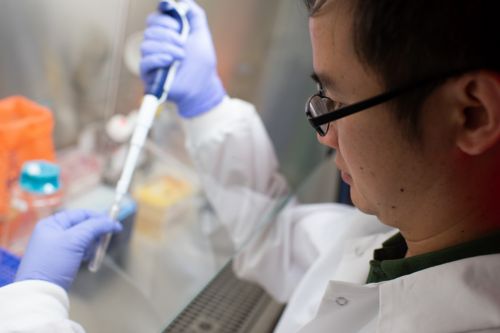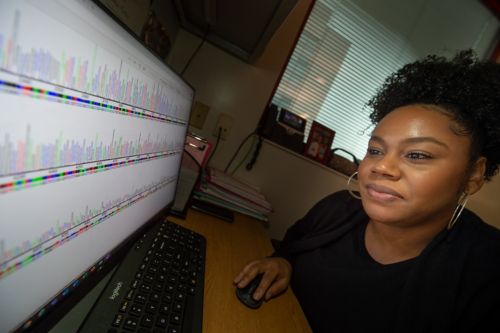St. Jude Family of Websites
Explore our cutting edge research, world-class patient care, career opportunities and more.
St. Jude Children's Research Hospital Home

- Fundraising
St. Jude Family of Websites
Explore our cutting edge research, world-class patient care, career opportunities and more.
St. Jude Children's Research Hospital Home

- Fundraising
John Crispino Lab
Understanding the mechanisms of normal and abnormal blood cell development
About the Crispino Lab
Mutations in transcription factors GATA1 and GATA2 are implicated in the development of blood disorders. We have an interest in understanding the role of these proteins in inherited anemias, leukemia, and myelodysplastic syndromes. Additionally, our laboratory explores the link between leukemia and Down syndrome. We use basic science to inform highly translational efforts. We strive to better understand disease progression and develop strategies for clinical intervention.

Our research summary
Focusing primarily on myeloid cells, the overarching focus of our laboratory centers on the mechanisms of normal and abnormal cell development. We study transcription factors and how they regulate specification or maintenance of particular lineages and focus primarily on the GATA1 and GATA2 transcription factors. In addition, we are investigating the signaling pathways and kinases that regulate differentiation of blood cells.
Inherited anemias
Our work in inherited hematologic disorders focuses on inherited anemias such as diamond blackfin anemia (DBA). Along this line of investigation, we are interested in how GATA1 mutations contribute to congenital anemias, with the goal of better understanding the disease and exploring the development of new treatments. Previous research in our laboratory has shown that the GATA1 short variant has an impaired ability to induce the activation of red cell or megakaryocyte genes. A major project in the laboratory aims to understand GATA1 partner proteins and to characterize the resultant protein complexes and transcription factors that are important for red cell and megakaryocyte production and maintenance. Although our research in the laboratory is rooted in basic science, it has translational implications, guiding therapeutic options for DBA and other inherited anemias that have GATA1 mutations.
In addition, our laboratory is launching a collaborative research project on a pediatric disease called GATA2 deficiency syndrome. The GATA2 mutations inherent in this syndrome lead to an immune disorder that has the propensity to later evolve into acute myelodysplastic syndrome or AML.

Leukemogenesis in children with Down syndrome
Children who have Down syndrome have a higher risk for developing B-cell acute lymphoblastic leukemia or a specific subtype of AML. Our laboratory investigates the role that genes on chromosome 21 play in the predisposition to those forms of leukemia. Evidence from our laboratory suggests that AML associated GATA1 mutations are acquired in fetal hematopoietic progenitor cells. A combination of these mutations and trisomy 21 leads to a disease called transient abnormal myelopoiesis (TAM), which has origins in utero and, for children with Down syndrome, comes with a higher risk of evolving into a form of AML called myeloid leukemia-Down syndrome (ML-DS). Our research aims to uncover how these GATA1 mutations contribute to ML-DS and which genes on chromosome 21 cause the predisposition for this form of leukemia. In addition, we strive to understand the genetic basis for the progression of TAM into ML-DS.
Along with developing a better understanding the mechanistic link between Down syndrome and leukemia, we are exploring the development of safer therapies for patients who tend to experience greater toxicities following conventional chemotherapy.
Myelodysplastic and myeloproliferative neoplasms
In our studies on malignant disorders, we are also investigating the progression of myelodysplastic and myeloproliferative neoplasms, both of which have a relatively high rate of transformation to acute myeloid leukemia. We study the biology of these diseases with a particular interest in how these diseases predispose people to subsequent AML, the type of which has no real treatment options. We aim to understand the pathways that drive myelodysplastic and myeloproliferative neoplasms progression to AML in order to development new treatments or find innovative strategies to stave off the onset of leukemia.
Selected publications
Contact us
John D. Crispino, PhD, MBA
Experimental Hematology
MS341
St. Jude Children’s Research Hospital

Memphis, TN, 38105-3678 USA GET DIRECTIONS